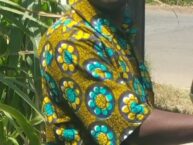Joram was about to exit the hut when his father’s wife said he couldn’t leave yet. She had an urgent issue to discuss with him. He stopped, wondering what could be more urgent than all the things they had done together.
He sat on the bed and waited for her to continue. She sat on the earthen bench opposite the bed and averted her eyes toward the door, which caused her to look shy, seductive. He could never get enough of her, but he wanted to start his day without arousing the suspicions of his father.
“I’m pregnant,” she said, looking at his face. Then she smiled, as if she expected his happy reaction.
He looked away, focused on a spider web by the hinges of the door. He needed to take care of it before it attracted scorpions. As for what she had said, he didn’t know what to think or how to respond. Then, he remembered he must look at her when she was talking to him. She was the mother after all.
“I hope you heard me?” she said, firmly.
He grinned and, with his head hung low. “Is this some form of practice or rehearsal?”
“Practice for what?” she said, her eyebrows twitching.
Perhaps she was not as beautiful as he had thought she was. He bit his lower lip and decided, emphatically, that she was more than beautiful; she could be everything to him now.
“Maybe you are practicing your delivery of the message, for when you actually become pregnant.” He held her gaze in place. “You just want to see how I will react, is that so?”
His father’s wife coughed out a quiet laugh—she didn’t want her husband to hear her, as she kept glancing at the door. Joram leaned forward, his face calmer.
“You don’t have to think about it or say anything now,” she said. “Let me do all the thinking and talking, as I’ve always done.” She paused. “And believe it, I’m still the mother here.”
“Please stop bullying me,” he said. “If all this is true, wouldn’t that make you my wife, as you’ve always wanted?”
“You’re really full of yourself,” she said. “I see now you’re going to beat your chest, walk around saying you’re man of the house.”
“Wasn’t I the man all along?” He looked around. “The way you’ve always rushed in here; did you think you were meeting a child?”
She opened her mouth and closed it. She turned her eyes to the door.
“I asked you a question,” he said, his voice shaking, but he didn’t want to show any weakness. He needed to show her how strong he was, especially now.
“I heard you,” she said. “But is your father in that hut no longer the head of this household? You’ve made your mind he’s nothing?”
She wanted to say more but didn’t want this to grow into an argument. After all, she was the one who was pregnant, not the two men in her life. She assumed that motherly tone again.
“Like I said, I chose to tell you this, and I know you were not expecting this to happen so soon.” She scratched the itch on her cheek. “I told you out of respect; you’re a man now, but not yet the Man.”
Joram leaned forward, controlling his anger. If she was pregnant with his child, she had to be used to him playing an important role in the planning, with or without her. He avoided her stare and looked at the long sun’s rays piercing through the two triangular windows of the hut. When they met in the center of the hut, where a fireplace used to be before the hut became his bedroom, they looked like two giant footprints. Her bare feet were partially illuminated by the rays.
He walked to the door and fastened the padlock. He didn’t want anyone to see them together in a hut which was supposed to be out of bounds to her, but she always found a reason to come: to make sure it was well swept, or to see that he kept his blankets clean, that his bed was made well, and indeed, she knew when those blankets were clean, and when—like now—they were disgusting.
She was wearing a Zambia wrap, which served as her skirt, with nothing underneath. The holes in her loose t-shirt, printed with the faded letters of the word San Francisco, gave the onlooker a generous view of her areolas. Her breasts looked firm and full. They had always been one of the features about her he could not have enough of. She seemed forever young, although she was a decade older than he. She used to joke that her body was built with him in mind, a body that could wait.
He sat by her on the bench. Then, without anyone telling him to, he started massaging her shoulders. Her body yielded and she looked up at the roof, as if she was counting the sooty framing poles. He wanted her this way, quiet, calm. It was her moment to receive, his to give.
She’d said she was the one to think and plan, but he saw no reason not to start running things as the man. This was the time he had dreamed about, when he had imagined the two of them escaping the village and going as far away as Gwanda, Gweru or Bulawayo, where he would look for a job and raise a family with her. At nineteen, he wanted to put his manhood to good use, away from his father’s homestead.
His fingers danced, circling the shoulder blade at first and clawing the lower part of her neck, while his eyes focused on the strands of grey hair exposed at the lower edges of her head wrap. It was just a sprinkling of salt, confirming her maturity and wisdom. This was a woman who could deploy the motherly care he still wanted. Just seeing her from this angle stirred his loins, but the fire quickly died when he thought again of the news of the pregnancy; he didn’t understand this feeling, for, on the one hand, he should be excited but, on the other, there was the issue of the father. She had always said she would remain loyal to him no matter what and would make sure she gave him another child – the reason he had married her in the first place.
He kept massaging her, now for his own relaxation, thinking that if he was expected to be excited by the news, he might as well make the moment festive. He was rubbing her the way she had rubbed him the day they buried his mother, when he was sixteen. She was his father’s second wife, and her arrival had been blessed by his mother, for this would help his father have more children.
Months after the marriage, his mother had fallen seriously ill and succumbed to a disease that was never diagnosed because she hated clinics. He had returned from boarding school to attend his mother’s funeral, and his father’s younger wife played a big part in consoling him, perfectly playing the role of a mother.
His return for the funeral also meant the end of his boarding school education; there was no money left to pay his fees. The local school only went up to Grade 7, and he had already started Form 3. A strong Form 3 drop out was employable during those days, but he had barely passed the Zimbabwe Junior Certificate, and there was no guarantee that he would succeed in GCE O-Level either. His father had told him that if he still wanted to finish school, he could do so later by correspondence with his own money. That talk had not gone well. He had cried, begged his father to change his mind, and cried again, when he realized that this wasn’t a joke—all the money had gone to the younger wife’s bride price.
On the last day of the funeral, when everyone had left, the young woman, whom Joram was to address as a mother, had wandered into this very hut, back when it was still a kitchen, and found him sitting on the bench, sobbing. She reassured him that, although his mother was irreplaceable, she would be as available for all his needs as any mother would and that he had no reason to feel lonley in this world.
That night he sobbed and sobbed, and she rubbed and rubbed, until his body started to respond. When he couldn’t take it any longer, he had bolted from the hut and spent half the night walking up and down Runde river. When he returned home, she was still waiting for him in his bedroom.
“I knew you would be back, which is why I told your father not to bother looking for you,” she whispered. “Now come to mother and be a good son.”
Her blouse was unbuttoned. He looked away at first, then turned to face her again. She came to where he stood and, instead of bolting, he fell into the comfort of her arms, officially consenting to the first act that would lead to more acts like it, done so discreetly that they both would be certain the father didn’t suspect anything, and no one in the village would know a thing about it.
“So are you going to let me do the planning and thinking?” she asked, her head tilted from the discomfort caused by his fingers on her nape.
He didn’t respond, but continued to squeeze her shoulder. Just when he was switching to her left shoulder, she turned and slapped him, like she had done when he was much younger, and instead of fighting back like he had before, he said, “I want you to know I have dreamed of running away with you for years.”
She stopped struggling and looked at him, her cheeks quivering. Then she slapped him on his chest, which made him wonder if she had heard him, or if she thought his words mattered at all. He let her struggle, to exhaust herself.
Outside, the neighbor’s dogs barked, and voices of villagers called out a greeting from the path. Then there was the braying of donkeys from the back of the compound. Joram needed to go let them out soon; otherwise, his father may wake up to do it. The old man couldn’t be bothered with those chores, given his increasing frailty. He had never been quite the same since the death of his senior wife. And many in the village wondered why he had taken such a young second wife, but he was not the only old man with a young wife in Mhototi.
Joram didn’t know how his father met her, but one day he’d returned home from school and found her there. When he’d asked his mother who she was, she’d told him to worry about school and reminded him how she and his father broke their backs working in the fields for his school fees. At that point though, the one who was breaking her back was his mother; the father back then spending time at home, already acting very old, yet he wanted a young wife. He cared about a new wife more than he cared about his son’s education. Joram had spent that first day mad. He left and walked to Gudo to talk with his uncle about it, but he was reminded that he should not meddle in his father’s business.
Even his mother reminded him that he was only a child and would always be his father’s child, no matter how tall he grew. He should make sure he worked hard in school and did something with his life to be an example to his siblings, who were yet to come; the reason his father had married young blood. These were blood matters, and he should celebrate that the family name would be guaranteed longevity. Joram felt an undefinable rage and spent time trying to understand why.
To get the answers his mother could not give, he had followed his father’s new wife, whom he’d been told to address as mother, to the river where she was fetching water and accused her of being a thief, or worse, but he didn’t articulate it, a witch. But as he threw boulders of words at her, he noticed how young and pretty she looked. She broke into loud laughter, bending with the effort, spilling breasts out of her plunge-line blouse, her treasured clothing item, and said, “Funny boy, or should I say man?”
“Man, of course!” he had said, touching his chin to show its fuzz.
“If you’re a real man, you’re not telling me that, in this whole village, husbands should only have one wife each, are you?”
He didn’t answer. He was thinking, doing a run-down of men in polygamies—old man Dzungu with four wives, Makanda with two, Mukomberi with five, and his own favorite old man in the village, VaBhunga, with seven…but still…
“Or, being the real man you say you’re becoming, are you not telling me that you can only manage one woman, are you?” She followed this up with another peel of laughter but stopped when she heard voices of other women coming to the river.
He slunk away, embarrassed, and troubled. He wondered if he had acted appropriately in front of her. This conversation had opened new feelings in him and he was afraid of what his father’s wife was capable of. He couldn’t pin down his feeling about it and felt bad that something in him stirred when he saw her cleavage. But she was his father’s wife, and he was his father’s son.
Her laughter stayed with him for days, and his mother’s advice to not worry about who his father chose to marry rang in his ears at random moments, even after he returned to school. Shortly after, his father told him he could not afford the school fees, which had been going up every year. Joram returned home raging, not at his father, not even at his step mother, but at life itself, at the possibility that he would live life as a pauper who had tasted education but not completed it.
She stopped thumping him and said, “So you were lying then?”
“About?”
“So now you don’t to help your father’s family grow?”
“When did we ever discuss that?” he asked, turning sharpy to look at her.
“But isn’t that what families here do too, just like they do in Mapaire? When an elder’s fire dies…” Her voice faded and she sniffled. Then she suddenly straightened, stiffened. “But did I give you the idea that I wanted you to steal me from my husband?” she asked. “Taking me away from him when he needs me the most, when the news of a new child could give him a few more years on this earth?” She looked at him with unblinking eyes, and he suddenly looked away.
She resumed her pattering slapping of his chest, which grew more rapid, and the hands turned into fists and started punching hard.
Then he decided to act the way the future would demand of him as her husband. He slapped her hard on both cheeks. For a moment she looked like she wanted to bolt, but then fell into his arms again, muffling her sobs. They both new the father, although sick, could easily be awakened by their noises. She leaned in so close that he could feel her stomach, and as he was about to touch it, to make sure that it was turning into a baby bump, they heard the squeal of a door from outside. They detached and stood as far apart as possible, looking at each other, but listening. He felt fear gripping him and was confused when he noticed that she was smiling and moving toward the door. Before she opened it, he jumped and grabbed her by the arm, pulling her back. She broke free and cracked the door open and looked outside, only to see her husband limping back into their bedroom. She closed the door and said, “There’s no one.”
They stood silently for a moment, then she said, “How serious were you when you said you wanted to run away together?”
“Now you ask?” he said, laughing carelessly.
“I think he heard us,” she said, chewing her lips.
He walked to the door, cracked it open, but he didn’t see his father—the door to his bedroom was shut. He turned and looked at her and felt his anger rise.
“And now you don’t want to make him proud anymore?” he said, grabbing the door’s handle. She shook her head and he knew that she didn’t want to hear whatever he was about to say.
“You said you don’t want to go with me, now are you saying you want to?” Again, he did not care if she would answer. He opened the door, shot out of the hut and dashed across the yard to the back of the compound where the donkey pen was located. He found that the donkeys had already been released. This was bad, but he had a matter bigger to think about. He did not walk back to the hut where she stood waiting for him. Instead, he continued walking toward the river, wandering off the clear path as if he didn’t want his tracks to be detected. In no time, he was running, feeling like he was going crazy, but anyone seeing him would easily have concluded that he was just on one of his routine jogs down the river.
Running cleared his head and made him think he could handle any issue that troubled him. He thought about what was to happen next, whether he would move out first and find a stand to set up his homestead in Zvemhuhwa near his uncle, or wait until the belly started showing, or until she told the father the truth (much would depend on what she wanted known), or wait until the father died—without trying to speed it up, as he had thought about many times before.
Back in the hut, she sat for a moment longer on the small bench, leaning her chin in her palm, looking at the floor, thinking. This young man wanted to elope now. Didn’t he know how much of a change that was going to be, how much that would just finish off the old man? Was he going to be man enough to go to Zvishavane and find a job? Was he already thinking about escaping to the towns? Her legs shook, giving her the look of someone dancing or walking while sitting.
Another thought struck her: maybe she would allow him to move out whenever he wanted, so she would continue to take care of his father, but would visit the son as many times as she wanted—whether or not the father would know he wasn’t the father, that was not important, for the child was going to be his son or daughter anyway. Culture said if a son sired a child with his father’s wife, that child belonged to the father and would refer to the biological father as brother. In fact, all the children she would have with him were going to be his siblings. If the son wanted children of his own, he would have to marry another woman, but as long as she lived, she wasn’t going to allow him to have that flexibility. She would make sure he was hers and hers only.
She smiled at the thought of beginning of a new life with her husband’s son. She would get ready to live a life with many new possibilities—all of that permitted by culture, only if she would convince the young man to slow things down. But the ways of the young were unpredictable sometimes. If she didn’t manage this matter well, it might explode, and blood may be spilled. She didn’t want to bring shame to this family. Yet, deep down, this was still culturally permissible, depending on what the villagers would choose to understand.
She heard the main bedroom hut’s door squeaking open again and sprung up to go meet her husband outside. If asked what she was doing in their son’s bedroom, she would just say she was checking if he had made his bed, or to check if the hut needed sweeping.
Outside, the husband was nowhere in sight. She wondered if she had actually heard something or if it had just been an echo in her head. The door to their bedroom was closed. She looked around the yard for a sign of the son, but she saw only Madzeya’s goats being let out by his youngest son, Tukanayi. He looked away when she waved at him. Madzeya had two wives, both close to his age, and each had given him three children; four sons and two daughters.
She went to the kitchen to get started on cooking the millet porridge her husband ate every morning. But it was already close to lunch, when he would want a bigger meal, with lots of vegetables. If he were to choose between breakfast and lunch, he would go for the latter. She decided to go check on him first, to wake him up, or to tell him to go back to sleep if he was awake.
She opened the door quietly, but he said, “Is that you, MaMoyo?” and before she could answer, he added, “You know I don’t know, and I will never know.”
The lowness of his voice made her heart race.
“Know what, Baba?” she asked, stuck in the doorway, but in no flight mode.
“He’ll forever be your son too,” he said. He was interrupted by a fit of coughing. “That child you told him about, it’s the ancestors remembering me.”
“What child, Baba?” she asked. Then she regretted asking, for the truth was written all over his face. He did not answer, but stared at the roof, licking his lips.
She remained in the doorway, unsure if he wanted her to say anything more, and if saying anything would shorten or prolong his life; on the bed, he turned and looked away from her, then before long, started snoring.
“Baba,” she called. “Baba, are you dreaming?” But he answered only with his snoring. She went back to the kitchen, unsure whether to feel blessed or damned, but she knew that whatever was going to happen next would depend on what the son would refuse to hear. That non-conformity, that trail of refusals where sometimes agreement would bring peace sooner, was what had always made her helpless in the arms of the son.
Mwenje Mafuta is a Zimbabwean writer based in the USA.



